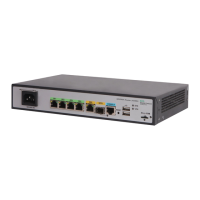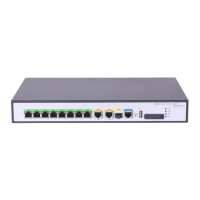444
MMM: Abbreviations of the months in English, which could be Jan, Feb, Mar, Apr, May, Jun, Jul,
Aug, Sep, Oct, Nov, or Dec.
DD: Date, starting with a space if it is less than 10, for example " 7".
hh:mm:ss:xxx: Local time, with hh in the range of 00 to 23, mm and ss in the range of 00 to 59,
and xxx in the range of 0 to 999.
YYYY: Year.
none: Indicates no time information is provided.
Examples
# Set the timestamp format to boot for logs sent to the console, monitor terminal, log buffer, and log
file.
<Sysname> system-view
[Sysname] info-center timestamp boot
Related commands
info-center timestamp loghost
info-center timestamp loghost
Use info-center timestamp loghost to set the timestamp format for logs sent to log hosts.
Use undo info-center timestamp loghost to restore the default.
Syntax
info-center timestamp loghost { date | iso | no-year-date | none }
undo info-center timestamp loghost
Default
The timestamp format for logs sent to log hosts is date.
Views
System view
Predefined user roles
network-admin
Parameters
date: Sets the timestamp format to mmm dd hh:mm:ss yyyy, such as Dec 8 10:12:21 2007. The
date time shows the current system time.
iso: Sets the ISO 8601 timestamp format, for example, 2009-09-21T15:32:55.
no-year-date: Sets the timestamp format to the current system date and time without year.
none: Indicates that no timestamp information is provided.
Examples
# Set the timestamp format to no-year-date for logs sent to log hosts.
<Sysname> system-view
[Sysname] info-center timestamp loghost no-year-date
Related commands
info-center timestamp
